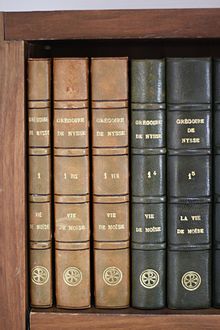Sources Chrétiennes
The Sources Chrétiennes ("Christian sources"), generally abbreviated as SC, are a collection of texts by the Church Fathers and have been published in France since 1943 by the Editions du Cerf. The aim of the series is to make the works of Christian authors of late antiquity and the early Middle Ages accessible and thus to contribute to a theology of ressourcement , a turn to the sources of the Christian faith. In addition, the Sources Chrétiennes offer a critical edition of the patristic texts by today's standards, each with the mostly Greek or Latin original, with a French translation and a comprehensive critical apparatus as well as corresponding introductions to the works, their author and the intellectual history background.
As early as the 1930s , the idea of publishing the writings of the church fathers on a larger scale matured in the scholastic school of the Jesuits in Fourvière in Lyon . From the beginning, the aim is to make a wider reading audience familiar with the spiritual sources of the early Church. Increasingly, however, the concern is gaining in importance to give science a reliable basis through a critical edition of the original text.
At the suggestion of Father Victor Fontoynont SJ, the project began to take shape in 1932. The first manuscripts were already available shortly before the beginning of the war, but in 1938 the highest superior of the Jesuit order in Rome gave the project a temporary refusal. As a result of the communication made difficult by the war, the local superiors decide to hold on to the preparations.
In 1941 the editorial board was formed: Fr. Henri de Lubac SJ in Lyon and Fr. Jean Daniélou SJ in Paris were in charge of the series . Last but not least, this dual leadership corresponds to the political situation in France, which during the war was divided into a German-occupied zone in the north and a free zone in the south. Editions du Cerf under the direction of P. Thomas Georges Chifflot OP are selected as the publisher. The first volume with the life of Moses ( Contemplation sur la vie de Moïse ) by Gregor von Nyssa appears in early 1943 . Due to the lack of paper, this volume, like the following six volumes, appears in the first edition as a pure translation without the original Greek text. The beginning of the series has been received with enthusiasm and has received diverse support, including from Henri-Irénée Marrou, professor at the Sorbonne University in Paris. In 1944, Father Claude Mondésert SJ was appointed secretary of Sources Chrétiennes and placed it on a solid financial basis. In addition to sponsorship money, he also received funding from the Center National de la Recherche Scientifique at the beginning of the 1950s, and in 1956 a sponsorship association, the Association des Amis de Sources Chrétiennes, was founded.
In general, it became apparent during these years that the series of publications is clearly aimed at theologians, historians and students, and less at a broad reading public. Special emphasis is placed on the works of the Greek fathers, with which the editors and other scholars of those years attempt to break the strong fixation of Roman theology on Augustine and Thomas Aquinas. The rediscovery of the Eastern Fathers is also intended to help bring Western theology closer to the so-called spiritual sense of writing, and to enable a better knowledge of the sources of Orthodox theology overall. Thus the work of a Latin church father appears in the series only with volume nineteen. In 1957, the publication of the eight baptismal catechesis by John Chrysostom , a text whose manuscript was discovered only two years earlier on Mount Athos , caused a sensation .
In 1969, within the Lyons theological faculty, the Secretariat of the Series became the Institut des Sources Chrétiennes. In 1984, Fr Claude Mondésert SJ, who has been the director of Sources Chrétiennes since 1960, hands over its management to Fr Dominique Bertrand SJ. Over the decades, numerous scholars, including Dominicans, Jesuits, and members of other orders, worked on the publication of the scriptures. The majority of the staff is now employed by the Center National de la Recherche Scientifique , which enables the institute to work.
The current director has been Bertrand Meunier since 2007 .
Of the 548 volumes that have now been published (as of August 2012), almost half (49%) deal with the Greek and around a third with the Latin fathers (33.8%). Seventy volumes offer translations by medieval authors, thirteen volumes deal with Syriac-Aramaic texts, and ten with ancient Jewish literature. The authors most represented in the collection are Origen , Johannes Chrysostomos , Tertullian , Bernhard von Clairvaux and Philo von Alexandria - this is not a church father, but a philosopher of early Judaism. Augustine can only be found with two works in the collection, as his writings are already published in a different series, in the Bibliothèque Augustinienne. The Institut des Sources Chrétiennes in Lyon publishes around eight new volumes every year.
Individual evidence
- ↑ See Étienne Fouilloux, La collection "Sources chrétiennes", Paris, Les éditions du Cerf, 2011, p. 62f.
- ^ Ibid. , P. 75f.
- ^ Claude Mondésert and Jean-Noël Guinot, Lire les Pères de l'Église dans la collection des Sources chrétiennes , Paris, éd. du Cerf, 2010, p. 8.
- ↑ Festschrift Sources chrétiennes , Célébration du 300e volume, éd. du Cerf, 1982, p. 3.

